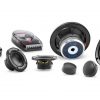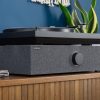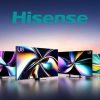You may not realize it, but just about every new DVD player and HDTV has a video scaler and/or de-interlacer already built into it. Essentially what it does is resize, reformat, convert, and enhance a video signal to make it look as sharp, clear and as lifelike as possible.
Why do I need a scaler?
You may be thinking, if my equipment already has this feature, why do I need to buy it again? The simple answer is — some scalers (video processors) do a better job than others. If you notice jagged edges, overly blurred motion scenes, overlapping colors, jumpy lines or flicker then you have noticed problems, called video artifacts. These artifacts are more common in older analog TVs mainly because they display less lines of resolution. Today’s HDTVs are capable of being four times better, which fixes some problems while errors in digital video processing can cause others.
What is a scaler & de-interlacer?
The scaler uses algorithms and interpolation methods to enhance, up-convert, or down-convert video. A de-interlacer converts interlaced video to progressive scan. In technical terms, it combines sequential fields of alternating lines (interlaced) into one video frame (progressive), effectively doubling the resolution. The better the scaler/de-interlacer, the better and more true to life the video looks.
CS-HD Basics
Now that I have given the background, I can better explain the features of the CS-HD. The CS-HD acts as central switcher connecting all of your video sources (DVD, Cable, Satellite, VCR) to your display device (TV, Projector or Computer Monitor). It will accept the following inputs: two composite video, two S-video, two- component, one progressive component, and a RGB pass-thru. It has two outputs: DVI and RGB (VGA).

Double the lines
The CS-HD converts/scales a regular TV signal, commonly referred to as 480i (480 lines of resolution – interlaced) or a progressive scan 480p signal into HDTV quality formats (720p, 1080i, and even 1080p). The video up-conversion more than doubles the lines of resolution by using proprietary computer calculations.
Does it work?
Ultimately, you want to know — will the CS-HD make my picture better? Unfortunately, there is no simple answer to this question. It depends on the equipment you already have. I was hoping for a dramatic improvement, but what I noticed was a subtle improvement on some displays more than others. I tested the CS-HD on three video displays, which included a 42-inch Plasma EDTV (852×480), a budget projector (964×544), and a rear projection (CRT) HDTV (1080i). Ideally, I would have liked to do side-by-side comparisons with and without the CS-HD, but I had to rely on my memory for all results.
Better front projection
The most noticeable improvements were recognized by up-converting 480i to 720p or 1080i. The projector yielded the best results. The Plasma EDTV showed the least improvement mainly because the CS-HD isn’t optimized or used to its full potential and it does not support 852x480p output resolution.
VCRs opted out
The CS-HD will most effectively improve 480i video from Cable or Satellite TV, as well as older DVD players. Regrettably, it does not work well with most low cost VCRs. VHS tapes tested showed jumping frames, because the CS-HD lacks a time based correction feature needed to work properly. However, higher-end VCRs may have the feature built-in, which should make it compatible with the CS-HD.
Making it work
Usability wasn’t quite what I had expected. The output setting is set once to the highest resolution of your display, but each input setting has to be manually selected whenever you switch video sources. A basic remote control and onscreen menu make things a little easier. However, get ready to macro program your universal remote, or your significant other or kids will be yelling at you when they can’t watch a DVD.
Cost factor
The CS-HD is considered a budget video scaler at $995, and is the least expensive in the Focus Enhancement’s line of video processors, which includes the CS-1 ($1,995) and CS-2 ($2,495). The CS-HD is more affordable but lacks key features found in the higher end models, such as DVI inputs and outputs (with HDCP), user definable output resolutions, time-based correction, and user upgradeable firmware.
Test it out
The bottom line is, try out the CS-HD if you desire better video performance. Hopefully, your local dealer can arrange a product loan before you make a purchase or can come to your home to set it up. If it makes a noticeable improvement with your system, then you can easily justify the cost.
Pros
- Accepts many video sources
- Converts 480i to HDTV
- Compatible with computer monitors or TVs
Cons
- No DVI inputs
- No time-based correction
- Cumbersome video switching
- Limited output resolutions
Test equipment:
Studio Experience Matinee 1HD Projector
BetterCables.com Cables
Zenith P42W34 42-inch Plasma EDTV
Zenith R40W26 40-inch Rear Projection CRT HDTV
Zenith DVB317 DVD Player
LG LSS-3200A DirecTV HDTV Receiver
Remember I am just one man with one opinion. If you own this product, or have a comment or question feel free to add your thoughts below.
Brian Mitchell
Founder & CEO
eCoustics.com
































